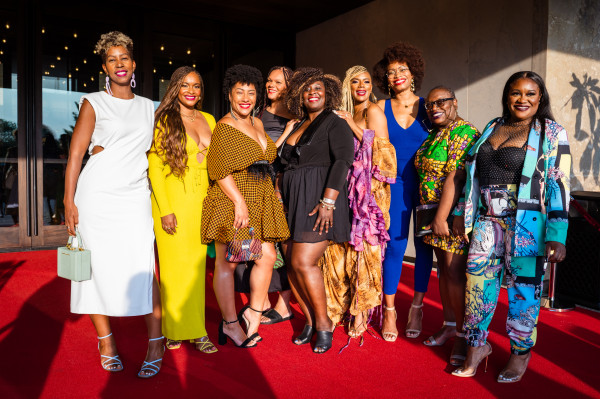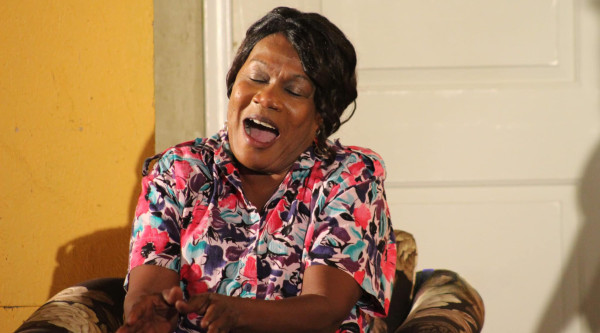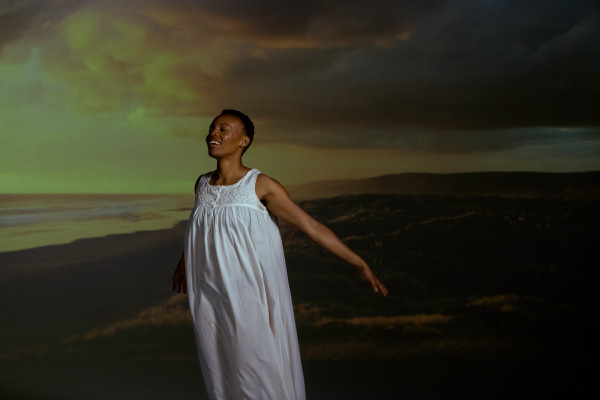The second installation in d’bi young anitaafrika’s The Orisha Trilogy- She, Mami Wata and The Pussy Witch Hunt closed this past weekend to a sold out house at Theatre Passe Muraille. The play is a tour de force of anitaafrika at her very best. It’s a high energy display of art and activism that will leave you exhausted, in a good way. The audience is a character in this production; one of the few times that audience interaction doesn’t come across as a gimmick but rather a necessary tool in communicating the message. Under the direction of the esteemed Jamaican director Owen ‘Blakka’ Ellis with musical accompaniment by the fierce Amina Alfred, the production echoes ensemble work. A masterful feat with so few bodies on the stage.
She, Mami Wata and The Pussy Witch Hunt tells the story of four Jamaican friends- Niki, Michael, Kizzy and Everdon growing up in modern-day Jamaica who navigate their friendship across the complexities of gender, sexual orientation, and societal expectations in the fictional, rural community of Little Rock, Jamaica. Niki and Michael are at the centre of the story. Niki has fled Little Rock embracing her sexuality. She is a pole dancer at The Pussy Witch Hunt. Michael has stayed in Little Rock and is now the Pastor of Little’s Rock Church of Righteous. The mirroring of their two journeys provides the foundation for a story that breaks open the human casualties of Jamaica’s anti-LGBT, and sometimes violent homophobic culture.
As a queer Jamaican, I found watching this work to be both nostalgic and emotional. Perhaps, it was equally fitting that I watched the production with past ByBlacks.com writer and friend Albert Williams. He was there for my coming out and I was there for his. We are both Jamaican, products of the theatre and members of the Black Diaspora. This is our review.
AW: What stood out strongly for me was the symbolism in the play, and of the altar in particular. The altar that Michael worships at is the altar that Niki dances at. Both characters found their strength in really the same place. Niki came to life. Michael, now Pastor M came to life and I think that was a symbolic juxtaposition of the two- the Church and the Strip Club. The two weren’t that different.
TW: Yes. That was the most striking element for me as well. The symbolism of the altar and the role of worship. When Michael is challenged by Nikki, she tells him that the Church is the safest place for him to be as a closeted homosexual. It will protect him and we know this. The Church is a place, whether they want to admit it or not, that is a safe haven for closeted gays. Niki’s safe haven is the strip club. I remember vividly when I first wanted to know where the other gay women were, I went to the strip club. I remember seeing maybe a handful of men in the club but many masculine-identified lesbians, and queer couples being open in this space and the confidence that came with that.
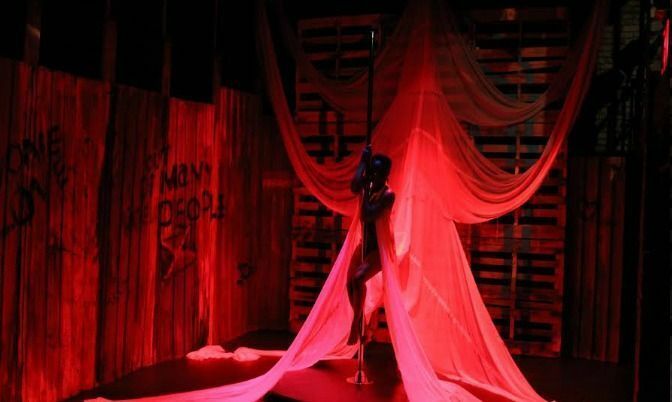
Photo by: Dee Kofri
AW: Can we talk about the songstress, Amina?
TW: Yes, she for me was the star.
AW: Her character really highlights the similarities between the Church space and the dancehall space. We were outside waiting for the play to start and d’bi comes out to call in the congregation and sister Kizzie has the program and we are all gathering to go inside. The music corrals the experience just like in the dance. That was powerfully reflected in Amina’s ability to switch from Choir director to selector. They are not that different. In the dancehall and the church there is performance, what is Sister So and So going to wear this week? You wear your best to dance and your best to Sunday Service. I don’t know if the symbolism was intentional but it was there.
TW: She was one person, but she was a chorus with her voice and instruments. She made a few key sounds and what was one person felt like twelve. She was the heart of the piece for me.
AW: I think about the playground scene where she makes the sound of the children through that giggle and you are immersed. She took you to the playground. You could see the children playing when it was really just d’bi on stage. The voices she used for each of the characters when they were children, the different movements. It felt right. It was perfect. It was authentically Jamaican. The opening scene added so much to the whole experience for me. Starting outside the theatre and being led in by Sister Kizzie. It set you in the right frame of mind to give of yourself to the play which worked because we were another character. It was a refreshing experience and I liked that.
TW: The play was a very authentic experience and I wonder how much of that authenticity came from Blakka’s direction. He has always excelled at strong direction of the Jamaican reality. The subtle nuances, the turn of phrase. What d’bi said about Blakka in the Q&A after was powerful and worth noting especially since the play will be going home to Jamaica. He immediately saw the controversy but said he can’t say no. He knows the risk he is taking by simply associating with this material.
AW: Oh yes. There will be backlash. People will have much to say about the whole thing.
TW: I wonder about the strip club scenes more than the gay scenes to be honest because there is always just one person. And the use of profane language as well. You know Jamaicans like to be self-righteous.
AW: Oh yes. When she cursed, she moved her whole body. Her whole body came up with the word and that may be some of her way of normalizing these words. Even being in the Pussy Witch Hunt she calls the audience pussy witches and it is a reclaiming of that. Even when someone in the congregation said Ashe and Pastor M said Ashe who. That is another example of rejection and reclamation. African retentions are rejected by the church but I would say that African retentions are free to exist in the dancehall space.
TW: I found the reclaiming of words and the Pussy Witch Hunt to be both striking and connecting. We think of Jamaican homophobia mostly from the male perspective but there is a strong link to the demonizing of the female body that she references. There is this ongoing witch hunt happening to women and it feeds this abuse of sexual desire and homophobia.
AW: Pussy Witch, gender expression, homophobia. They are all linked. I read homophobia, and Jamaican homophobia in particular, sometimes as misogyny. It is a hatred and rejection of all things female. You’re not being a true man. Women are to be controlled. You can’t do this. So it was powerful to see Niki in charge of this space and reclaim these words and scenarios used to assault her body.
TW: She highlights that witch hunt really well in the hilarious telling of Adam and Eve. Eve is made from Adam’s rib and comes out hungry as she puts it. It establishes patriarchy and is the constant mantra of the Bible-thumping homophobia movement, “God created Adam and Eve, not Adam and Steve.” Yet, in this fictional tale Eve is treated as someone that can’t even be left alone. The one time she was left alone she ate the apple that has brought sin into our lives and women will forever pay for that mistake. There is nothing to be proud of in this story.
AW: At the end, when Niki returns to the church and is stoned to death. It is jarring but in many ways, she still won because she lived and died as herself. Everdon who becomes Everdeen realizes that he will never have a real relationship with Michael. Pastor M who slips up in church and starts talking about the desirability of men, and having to recover from that. So Niki is gone but she wins. She leaves empowered.
She, Mami Wata and The Pussy Witch Hunt excels at asking tough questions about one of the most controversial issues in Jamaican society. As the character of Niki says, activist Maurice Tomlinson is currently in court mounting a human rights challenge against Jamaica’s buggery laws. This need to ground the play in the now, to explain to a Canadian audience sometimes weakened the power of the storytelling. The Mami Wata or water motif was found wanting in most instances and could benefit from more development. We were told to prepare for the story of four friends but only heard the story of two friends. She, Mami Wata, and The Pussy Witch Hunt is an evolving piece that with a few edits could easily be a five-star production.
The third and final instalment of The Orisha Trilogy, Bleeders will premiere during Summerworks 2016. The annual theatre festival runs from August 4-14, 2016.
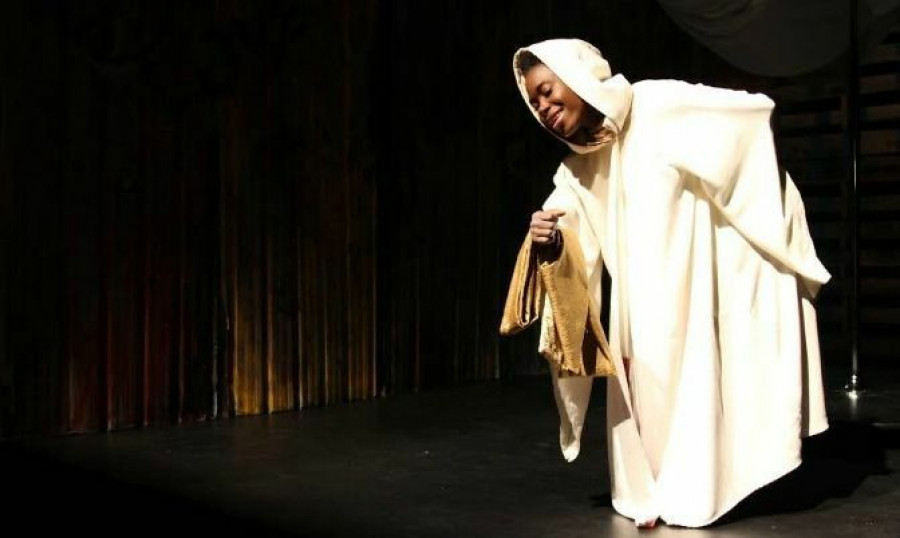
 By
By 




![[REVIEW] How Black Mothers Say I Love You Is Trey Anthony's Best Work Yet](/media/k2/items/cache/34881b8882798e6c95711d6bcfcd403c_S.jpg?t=20200902_161308)
![[REVIEW] A Modern American Tragedy: Father Comes Home from the War](/media/k2/items/cache/1aa2f7441c2e1e8ce1ae43bf58de9bfa_S.jpg?t=20170408_224438)
